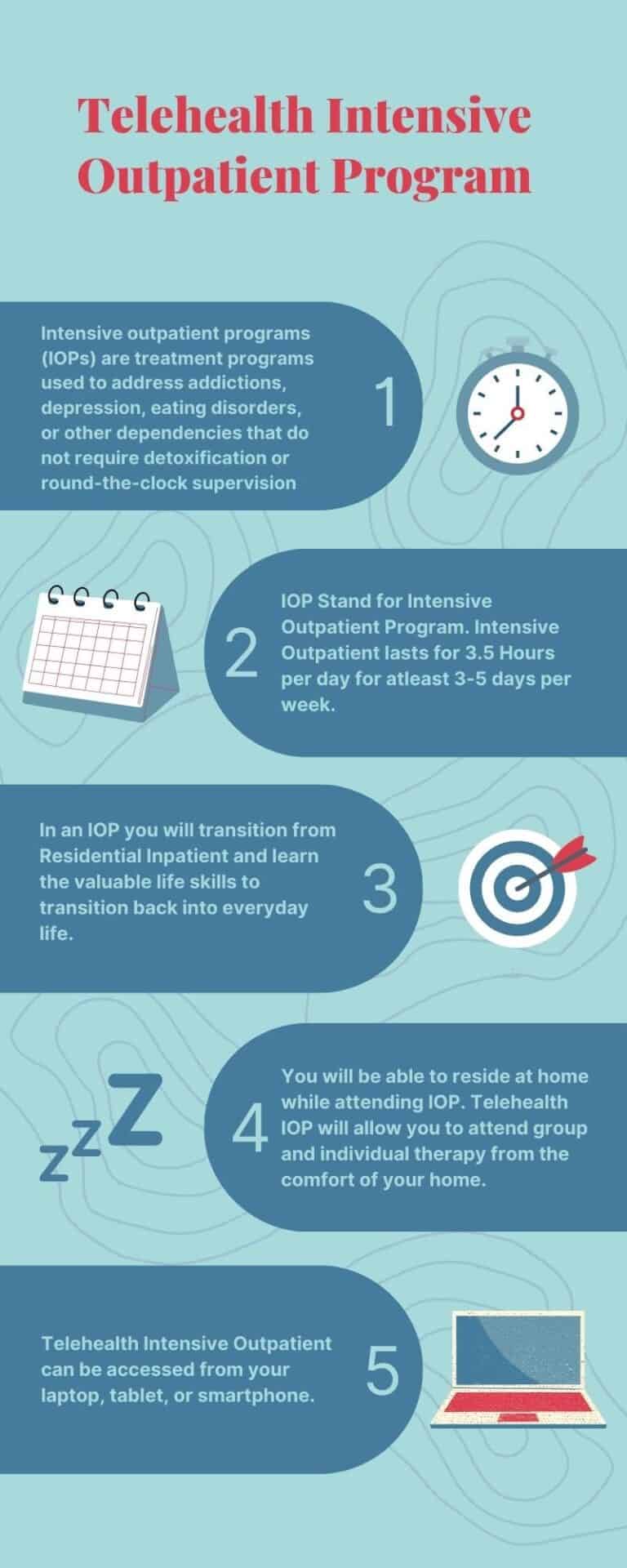Discover the Advantages of an Intensive Outpatient Program (IOP) for Healing
Discover the Advantages of an Intensive Outpatient Program (IOP) for Healing
Blog Article
Navigating the Intricacies of Double Diagnosis Therapy Within an Intensive Outpatient Program Setting
In the realm of mental health and wellness and addiction treatment, the junction of double medical diagnosis offers a nuanced obstacle that demands a comprehensive and customized approach. Within the confines of an Intensive Outpatient Program (IOP) setup, the intricacies of dealing with co-occurring mental health problems and compound utilize conditions need a fragile balance of knowledge and resources to navigate. The assimilation of evidence-based practices, collective initiatives among multidisciplinary groups, and an eager understanding of the one-of-a-kind needs of each person are essential elements in successfully handling twin medical diagnosis within an IOP framework. By discovering the intricacies of dual medical diagnosis treatment within this extensive outpatient context, a clearer path arises in the direction of holistic and sustainable recovery for those grappling with these intertwined challenges.
Twin Diagnosis Overview
What is the relevance of recognizing twin medical diagnosis in psychological health therapy? It is important to recognize and address this comorbidity as it can significantly affect the performance of mental health and wellness treatment.
Understanding twin diagnosis is important as it calls for a comprehensive and integrated strategy to treatment. By acknowledging the interplay between compound use and psychological wellness, doctor can tailor treatments to fulfill the unique demands of each person. This holistic technique not only addresses symptoms yet likewise targets underlying aspects that add to the twin medical diagnosis.
Additionally, untreated twin medical diagnosis can cause a cycle of relapse and worsening mental wellness symptoms. By identifying the complexity of double medical diagnosis and supplying customized treatment, health care specialists can sustain people in accomplishing long-term recovery and improved mental health.
Tailored Therapy Plans
Acknowledging the detailed interaction in between compound use disorders and mental health and wellness problems, the development of customized therapy plans is critical in attending to the intricacies of dual medical diagnosis in mental health and wellness treatment. Tailored treatment strategies are individualized methods that take into consideration the special demands, difficulties, and objectives of people facing twin medical diagnosis. These strategies are designed collaboratively by a multidisciplinary team of specialists, including psychiatrists, psycho therapists, social employees, and addiction professionals, to make sure detailed and integrated treatment.
Tailored therapy strategies typically include a mix of therapies, drugs, and behavioral interventions that target both the material use disorder and the mental health condition all at once. These strategies might include cognitive-behavioral therapy, dialectical behavior modification, medication-assisted treatment, individual counseling, team therapy, and household therapy, among various other evidence-based treatments. By tailoring treatment approaches to private circumstances, customized plans can attend to the root causes of dual medical diagnosis, promote long-term recuperation, and improve overall lifestyle for individuals having a hard time with co-occurring problems.
Integrated Treatment Strategy

In addition, the social element of incorporated care entails link addressing ecological aspects that might add to the advancement or perpetuation of substance use and mental health issues. This can consist of over at this website family members characteristics, real estate instability, or absence of social support. By integrating social interventions like family treatment, employment support, and area sources, the therapy becomes a lot more alternative and customized to the person's specific needs. On the whole, an incorporated treatment technique in dual diagnosis therapy within an intensive outpatient program setting aims to give extensive, efficient, and individualized like people dealing with co-occurring problems.
Challenges in IOP Establishing
In the context of twin medical diagnosis treatment within an intensive outpatient program, navigating the intricacies of co-occurring substance usage problems and mental wellness problems provides significant obstacles. One of the key difficulties in the IOP setup is the control of care between mental health and wellness professionals and drug abuse professionals to guarantee a comprehensive therapy method. This needs reliable communication, cooperation, and a deep understanding of how these problems communicate and affect each other.
Furthermore, the rising and falling nature important use problems and psychological health conditions adds an additional layer of complexity - Intensive Outpatient Program (IOP). Clients in an IOP may experience abrupt shifts in their symptoms or compound desires, needing timely treatment and adjustment of treatment strategies. Balancing the intensity of therapy and support while allowing customers the versatility to handle their daily duties can be a delicate equilibrium to keep
Moreover, attending to preconception and resistance to treatment within the IOP setup can restrain progression. Some individuals may be hesitant to reveal their double medical diagnosis or might really feel ashamed, hindering their engagement in the restorative process. Getting over these obstacles demands an encouraging and non-judgmental setting that fosters count on and visibility.

Collaborative Expert Efforts

Collective efforts likewise include regular communication and details sharing among team members to make certain a cohesive therapy strategy - Intensive Outpatient Program (IOP). This may involve situation seminars, joint sessions with the client, or shared documentation to track development and change therapy methods as required. Furthermore, partnership might consist of entailing other healthcare professionals such as medical care doctors or household therapists to supply all natural assistance to the person. Ultimately, a united front of specialists interacting enhances the performance of twin diagnosis therapy within an intensive outpatient program.
Conclusion
In conclusion, reliable double diagnosis therapy within an intensive outpatient program setup calls for tailored treatment strategies and an integrated treatment method. Obstacles may arise in this setup, but joint initiatives amongst experts can assist navigate these intricacies. By addressing the one-of-a-kind requirements of individuals with co-occurring psychological health and wellness and substance utilize problems, IOP programs can supply comprehensive and alternative treatment to sustain recuperation and overall health.
Report this page